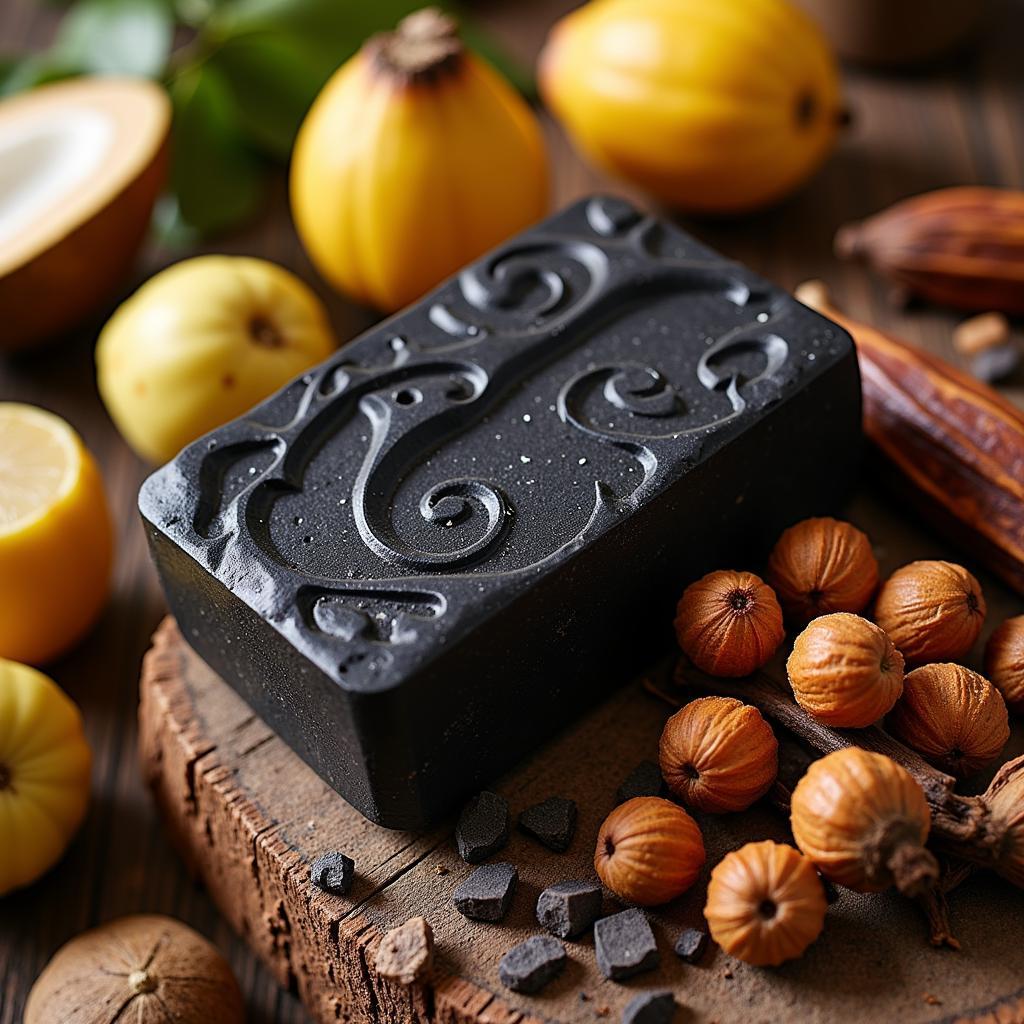African Black Soap: Unveiling the Ancient Beauty Secret of Africa
For centuries, African black soap has been a staple in skincare routines across the continent. This all-natural wonder, made from a blend of indigenous African plants, holds the key to healthy, radiant skin. In this comprehensive guide, we’ll delve deep into the origins, benefits, and uses of African black soap, helping you unlock the secrets to a naturally glowing complexion.
 African Black Soap Ingredients
African Black Soap Ingredients
A Journey Back in Time: The Origins of African Black Soap
The history of African black soap is deeply intertwined with the cultural heritage of various West African communities, particularly in Ghana, Nigeria, and Benin. Passed down through generations, the traditional soap-making process is a testament to the ancient wisdom of harnessing the power of nature.
While the exact origins remain shrouded in the mists of time, evidence suggests that the Yoruba people of Nigeria played a pivotal role in developing and popularizing this unique soap. The craft was often passed down through families, with each adding their unique touch to the recipe, resulting in slight variations in texture, color, and scent.
Deciphering the Magic: What Makes African Black Soap Special?
Unlike commercial soaps laden with harsh chemicals, African black soap boasts a simple yet powerful composition, typically consisting of:
- Plantain Skins: Rich in vitamins A and E, plantain skins promote skin cell regeneration, reduce hyperpigmentation, and soothe inflammation.
- Cocoa Pods: Packed with antioxidants, cocoa pods protect against free radical damage, boost collagen production, and enhance skin elasticity.
- Palm Oil: This nourishing oil deeply moisturizes the skin, improves skin tone, and provides a protective barrier against environmental aggressors.
- Shea Butter: Renowned for its healing properties, shea butter soothes dryness, reduces blemishes, and promotes a youthful glow.
Unveiling the Benefits: Why Choose African Black Soap?
The unique blend of natural ingredients in African black soap makes it suitable for all skin types, offering a wide array of benefits:
- Deep Cleansing: African black soap effectively removes dirt, makeup, and impurities without stripping the skin of its natural oils.
- Acne Control: Its antibacterial and anti-inflammatory properties help combat acne-causing bacteria, reduce redness, and prevent future breakouts.
- Eczema and Psoriasis Relief: The soap’s gentle exfoliating action soothes irritation, reduces itching, and promotes healing in skin conditions like eczema and psoriasis.
- Hyperpigmentation Reduction: Regular use can help fade dark spots, acne scars, and hyperpigmentation, revealing a more even skin tone.
- Anti-Aging Properties: The antioxidants in African black soap fight free radicals, reduce wrinkles, and promote a youthful complexion.
Navigating the World of African Black Soap: What to Look For
When choosing African black soap, it’s crucial to opt for authentic, unprocessed versions. Look for soaps that are:
- Raw and Unrefined: Authentic African black soap has a characteristically raw and unrefined appearance. It may vary in color from dark brown to black, with a slightly crumbly texture.
- Handmade: Choose soaps that are traditionally handcrafted, as this ensures the preservation of the natural ingredients and their benefits.
- Free of Artificial Additives: Avoid soaps that contain artificial fragrances, colors, or preservatives, as these can irritate sensitive skin.
Integrating African Black Soap into Your Skincare Routine
Incorporating African black soap into your daily regimen is simple:
- Lather Up: Wet the soap bar and rub it between your hands to create a rich lather.
- Gentle Cleansing: Massage the lather onto your face and body using gentle, circular motions.
- Rinse Thoroughly: Rinse off the soap completely with lukewarm water.
- Moisturize: Follow up with a moisturizer suited for your skin type.
Addressing Common Concerns: Is African Black Soap Right for You?
Q: Can I use African black soap if I have sensitive skin?
A: While generally safe, African black soap can be drying for some. If you have sensitive skin, it’s best to do a patch test first and use it sparingly.
Q: How often should I use African black soap?
A: Start by using it once a day and gradually increase the frequency as your skin adjusts. Overuse can lead to dryness.
Q: Can African black soap help with hyperpigmentation?
A: Yes, the natural ingredients in African black soap can help fade dark spots and even out skin tone over time.
Embracing the Power of Nature: African Black Soap for Radiant Skin
African black soap is more than just a cleanser; it’s a testament to the enduring wisdom of traditional African skincare practices. By embracing this natural wonder, you’re not just choosing a product but embarking on a journey towards healthier, more radiant skin. Remember to choose authentic, unrefined soaps and listen to your skin’s needs for optimal results.
Looking for other ways to enhance your natural beauty? Explore the art of African henna tattoo and discover the vibrant world of African beauty shops online in the UK. And don’t forget to delve into the delicious world of African food for a truly immersive cultural experience. For those seeking the finest natural ingredients, explore the world of African black soap at Whole Foods and discover the true essence of African beauty.
Need further assistance? Contact us at +255768904061 or kaka.mag@gmail.com. You can also visit us at Mbarali DC Mawindi, Kangaga, Tanzania. Our dedicated customer support team is available 24/7 to assist you.



